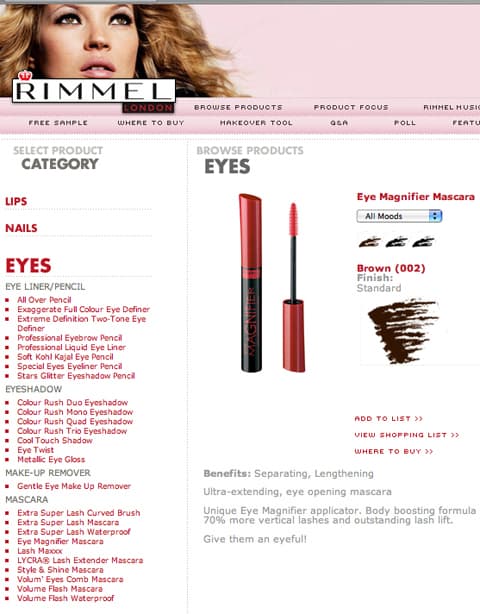Advertisers who digitally enhanced Kate Moss?s eyelashes, to give them more ?lift? for TV and magazine adverts, broke advertising regulations, the industry watchdog has ruled.
The adverts for Rimmel mascara claimed a ?traffic-stopping lashes breakthrough? using a new mascara brush that they said would give consumers ?70% more vertical lashes?.
The ads were headlined ?New Magif?eyes Mascara?.
The advertising agency, J Walter Thompson Ltd (JWT), insisted that Kate Moss was not wearing false eyelashes on the photo shoot but admitted that it had ?cleaned-up and enhanced? the images of the lashes in ?post production?.
The advertisers based their claim on before and after photos of ten females who tested the product – images they later used to compare the extent of the eyelash lift.
However, upholding complaints about the advert ? the Advertising Standards Authority (ASA) ruled: ?The ASA was concerned that Rimmel had failed to provide evidence that confirmed Kate Moss was not wearing false lashes. We were also concerned that JWT said they had retouched the lashes in post production, but had not provided data that clarified the extent to which that had altered the appearance of the lashes.?
The ASA ruled that using digital images to compare the extent of the eyelash lift could have misled consumers into believing that the product increases the actual eyelash length.
The watchdog added: ?Because we had not received documentary evidence that Kate Moss was not wearing false eyelashes in the ads we concluded that the images of the eyelashes in the press and TV ads may have exaggerated the benefits of the product, and were likely to mislead customers.?
Controversy over digital manipulation of images used in the media is nothing new. Last week, culture secretary James Purnell came under fire over claims he agreed that an NHS Trust could superimpose him onto a publicity photograph after he missed the photo shoot.
Last year, a Reuters photographer was sacked for digitally ‘doctoring’ two images which seemingly exaggerated the impact of Israeli air strikes on Lebanon.
And, earlier this year, a photographer resigned from his newspaper in the United States after it unknowingly published dozens of his images which it claimed were ‘digitally manipulated’.
Picture: A Rimmel mascara, as shown on the maker’s website. Adverts for another product called ‘Magif?eyes Mascara’, which appeared on TV and in magazines, broke advertising rules






